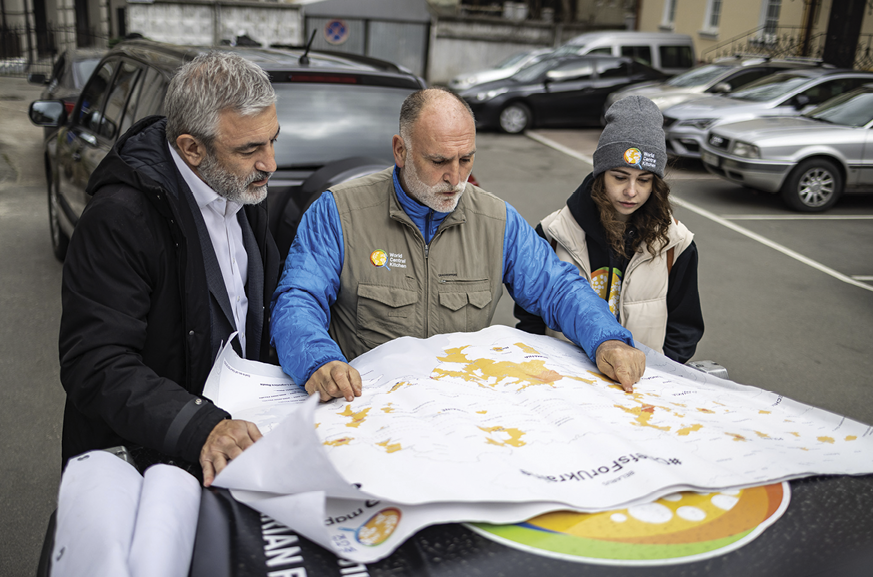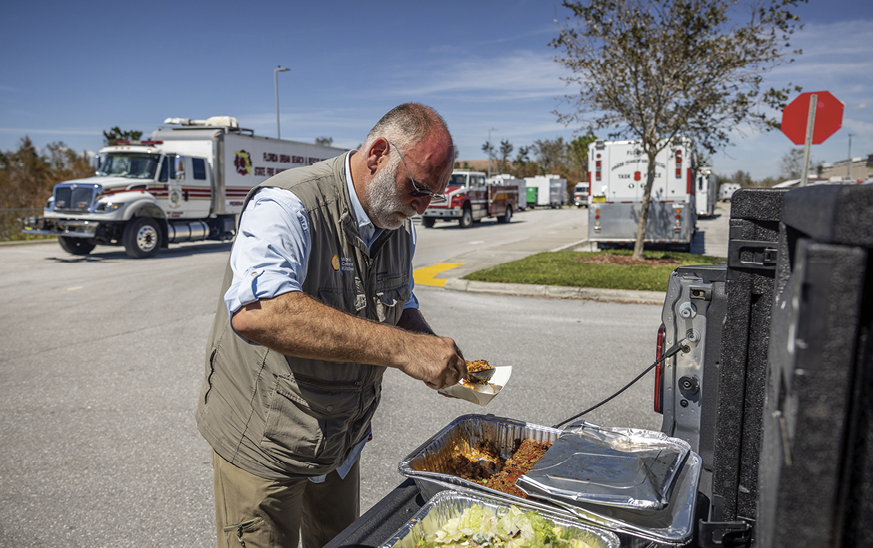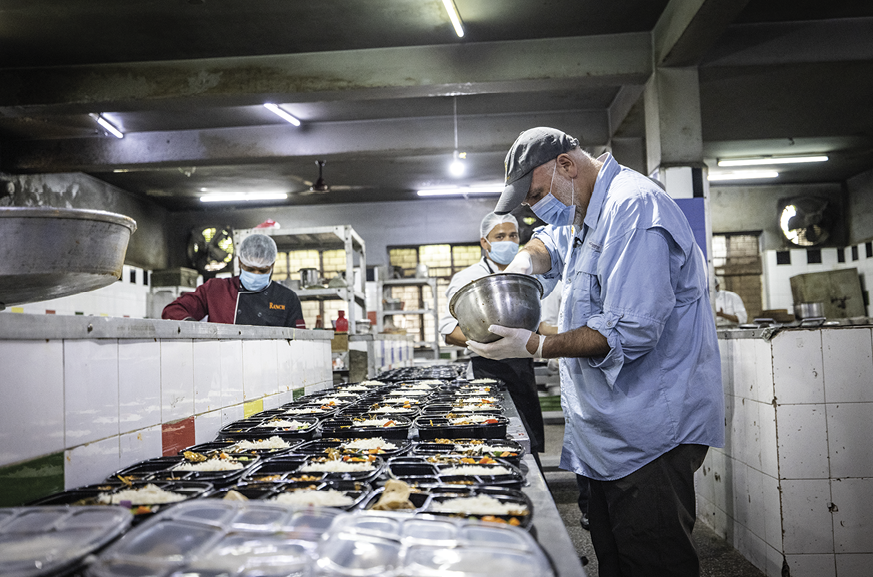- Home
- Media Kit
- MediaJet
- Current Issue
- Past Issues
- Ad Specs-Submission
- Ad Print Settings
- Reprints (PDF)
- Photo Specifications (PDF)
- Contact Us
![]()
ONLINE
![]()
ONLINE

A Plate of Hope
Editors’ Note
Chef José Andrés, born and trained in Spain, moved to the U.S. at age 21. He soon settled in Washington, DC, and began volunteering at DC Central Kitchen, where he started to think big about philanthropy. Over the course of his career as a chef and restaurateur, he saw the role of cooks – and the power of food – to change the world. This path inspired Andrés to found World Central Kitchen in 2010 after a devastating earthquake in Haiti, with the support of his wife Patricia, as well as his business partner, Rob Wilder, and his wife Robin. Since then, he’s pursued a mission to fulfill the words of John Steinbeck: “Wherever there’s a fight so that hungry people may eat… we’ll be there.”
Institution Brief
World Central Kitchen (WCK) is a nonprofit organization that is first to the front lines providing fresh meals in response to crises, while working to build resilient food systems with locally-led solutions. Applying a model of quick action, leveraging local resources, and adapting in real time, WCK (wck.org) has served more than 250 million nourishing meals around the world. When disaster strikes, WCK’s Relief Team mobilizes with the urgency of now to start cooking and serving meals to people in need. By partnering with organizations on the ground and activating a network of local restaurants, food trucks, and emergency kitchens, WCK serves comforting meals to survivors of disasters quickly and effectively. To support regional economies, WCK prioritizes purchasing local ingredients to cook with or distribute directly to families in need. WCK knows that good food provides not only nourishment, but also comfort and hope, especially in times of crisis.

Chef José Andrés maps out plans in Ukraine
What was your vision for creating World Central Kitchen and how do you define its mission?
I went to Haiti in 2010 after the devastating earthquake and there began, in many ways, the story of World Central Kitchen. After a disaster, food is the fastest way to rebuild our sense of community. We can put people back to work preparing it, and we can put lives back together by fighting hunger. Food relief is not just a meal that keeps hunger away. It’s a plate of hope. It tells you in your darkest hour that someone, somewhere, cares about you. That has been our mission since the beginning.
Will you provide an overview of World Central Kitchen’s work?
We are the first to the front lines to feed those in need in times of crisis. We put boots on the ground as soon as we can, whether it’s to respond to a hurricane that hits the Gulf of Mexico, wildfires that rip through Northern California, or the devastating earthquakes that recently hit Turkey and Syria. We act with the urgency of now because when you are hungry, it cannot wait until tomorrow.
“Food relief is not just a meal that keeps hunger away. It’s a plate of hope. It tells you in your darkest hour that someone, somewhere, cares about you.”
How critical has it been to build such a strong team for World Central Kitchen?
Many times people ask me how we are in so many places, so quickly, but that is because World Central Kitchen is not just me – it is we the people. We are lucky to have an amazing team who are inspired to be a part of our mission, and in turn, they inspire me each and every day. I like to think that we have the biggest reach of any organization in history, because every chef, every restaurant, every food warehouse, every volunteer wanting to help – they are all a part of WCK, they just don’t know it yet. Each and every one of us has the spirit of WCK inside – we just need to embrace it.

Chef Andrés serving in Florida following Hurricane Ian
What are the keys to being successful in providing meals in response to humanitarian, climate, and community crises?
Many complex problems have simple solutions. This is important to remember so we don’t get overwhelmed and lose sight of our most powerful tools – hope and empathy. Whatever crisis we are faced with, it begins by looking for what we can build on quickly. What do we have in front of us? Is there a kitchen that was spared, and can we cook there? Are there restaurants that can get cooking? Are volunteers ready to get going? Instead of spending a long time planning, you just have to show up, jump in, and get to work.
How is World Central Kitchen working to build resilient food systems with locally-led solutions?
We work with local partners – restaurants, food trucks, caterers – to be able to reach as many people in need as possible. After Hurricane Maria, it was Puerto Ricans feeding Puerto Ricans. For the last year in Ukraine, it has been Ukrainians feeding Ukrainians. In Turkey right now, it is the same. We see communities coming together to share resources and work as one kitchen to feed the people. That is what we mean by locally-led – seeing what resources are already in place and helping those who supply the food chain and make food in their communities get back to work doing what they do best.
“Success is a child who does not go to bed hungry.
It is handing someone a warm bowl of soup in the
cold night of winter. It is seeing a local restaurant reopen its doors.”
How do you define success for World Central Kitchen?
Success is a child who does not go to bed hungry. It is handing someone a warm bowl of soup in the cold night of winter. It is seeing a local restaurant reopen its doors. It is a family in need that realizes their neighbors have not forgotten about them. It is seeing the best of humanity come out in the worst of times.
World Central Kitchen has been on the front lines of many crises. Are you able to take moments to reflect on the impact that the organization has made and the lives that it has touched?
My good friend and mentor, Robert Egger, who founded DC Central Kitchen in 1993, said to me that it seems charity is about the redemption of the giver when charity should be about the liberation of the receiver. It is what you see on the front lines – it is about dignity and respect.

Chef Andrés preparing meals in India
What role has resilience played in your life?
Emergencies force you to solve short-term problems of food and water with energy and efficiency. You do not have time to get stuck in planning to the point where you do nothing. The truth is, sometimes, many times in fact, there is no perfect solution, but you keep going and then you realize, wow, by doing, by not stopping, that resilience is the solution.
What advice do you offer to young people interested in pursuing a career as a chef?
My father showed me the power of fire, and that controlling the fire was more important than the cooking itself. Every young chef has the urge to get in and cook on day 1, but if you back up and really learn to control the fire, then you can do any cooking you want. It is the advice I come back to again and again, many years later.![]()